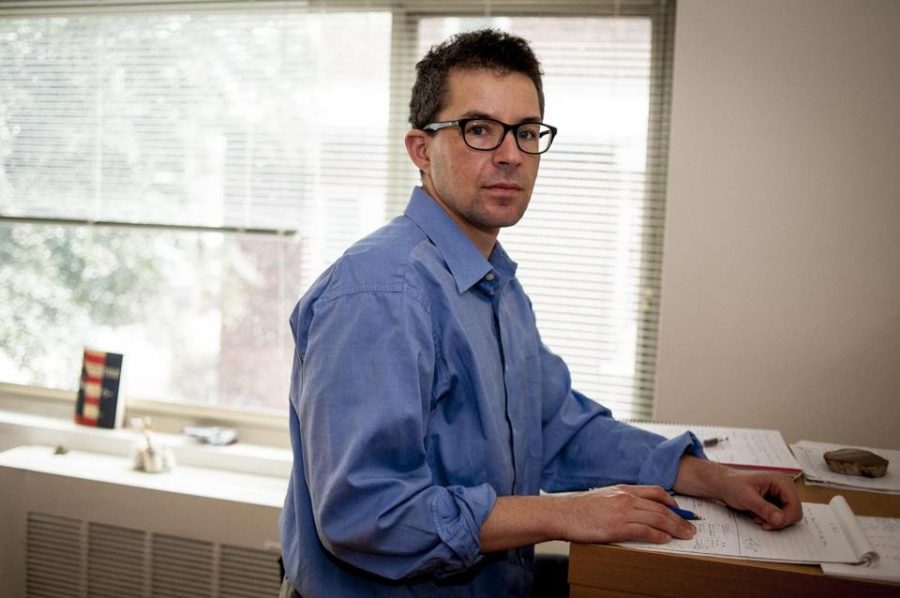Alex Myers visited TAS last August to talk about his first novel, Revolutionary. Revolutionary is a book based on the true story of Deborah Samson, a female soldier who participated in the American Revolutionary War. Myers went through a lot of research and visited the places where the real Deborah Samson has spent her life. He says he was “astonished by how the places were preserved and used as memorials.”
Myers, currently an English teacher at a secondary school in New Hampshire, decided to become a writer after experiencing an affection in writing for himself. Myers continued to gather experience in writing as he asked himself many questions including, “what would this feel like?” or “how does this work?”
Revolutionary has also inspired TAS students to promote women’s rights and gender equality.“Revolutionary really emphasized the oppression against women in past US history, but even reading about Deborah Samson now, I can still make connections with the many oppressed groups of women in our modern society; which just shows how much progress humanity has made. We need to take action.” says Vanessa Tsao (10). “I really enjoyed the book and I admire Deborah greatly, although I felt that the ending was bittersweet. I found it intriguing that it alludes to the struggle of understanding one’s gender identity and it helped me understand the idea of gender identity better. Gender is a spectrum. Gender roles should never limit one’s potential and dreams.”
Myers openly identifies as transgender. “When I was really little, I remember thinking I was a boy and somehow other people just really didn’t understand that,” he says. I’d be three or four years old and playing [with] my brother who is older than I am. He might say something like, “you can’t do that because you’re a girl!” And I’d be like, “no, I’m not.”
His mother used to wish Myers was more feminine. “She would buy me skirts and want me to wear them. I would always cry and scream, and not want to wear them,” he says. However, he says “it took [his family] some time to realize that [the transition] was going to be fine.” Myers emphasizes that even family members might not be supportive of one’s decision at first. But with time and communication there will be support and understanding. Later, his brother understood that “how [Myers] acted as a kid [made] a lot of sense”. Myers really was a boy.
Myers believes he is lucky to have a “very supportive” brother He was one of the people who said, ‘“wow that totally makes sense now that you say that”’ after Myers expressed his decision about transition. On the other hand, his parents took time. “I think my parents ultimately were very supportive but it took them some time to realize that this was going to be fine, it was going to be okay, and I was going to be happy, successful person. So first they were upset but mostly they were nervous. They weren’t sure what this was going to mean for me.”
After visiting TAS, Myers says he thinks TAS is a very supportive school and he hopes students will have the courage to communicate about their identities openly. However, if the students do not feel like this is a safe environment, he hopes they are not being pressured to do so. “It seems to me that [TAS] is a community that is open to self reflection and change.”


![Sofia Valadao [Erin Wu/The Blue&Gold]
Erin Wu [Annabelle Hsu/The Blue&Gold]](https://blueandgoldonline.org/wp-content/uploads/2025/05/erin-sofia-pic.png)
![Dr. Simeondis, Mr. Anderson. [Annabelle Hsu/The Blue&Gold]](https://blueandgoldonline.org/wp-content/uploads/2025/05/teachers-1200x675.jpg)
![[PHOTO COURTESY OF UNCULTURED, JUNIPER AND CO.]](https://blueandgoldonline.org/wp-content/uploads/2025/05/student-businesses-1200x675.png)
![Photo of the girl's varsity badminton team [PHOTO COURTESY OF TAS ATHLETICS]](https://blueandgoldonline.org/wp-content/uploads/2025/05/BadmintonTeam-04839-1200x675.jpg)
![The Institute for Speech and Debate, now based all across the east coast of the US. [PHOTO COURTESY OF MR. WILLIAMS]
Mr. Morris' various ceramic artwork. [PHOTO COURTESY OF MR. MORRIS]](https://blueandgoldonline.org/wp-content/uploads/2025/05/Untitled-design-1-1200x918.png)
![Mr. Castro celebrates at the finish line. [PHOTO COURTESY OF MR. CASTRO]](https://blueandgoldonline.org/wp-content/uploads/2025/04/20240513_092650124_iOS-e1745300337344-1200x1116.jpeg)